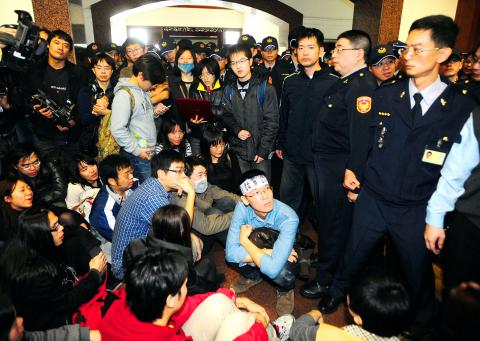Upset at the Chinese Nationalist Party (KMT) caucus’ decision to withdraw its support for bill against media monopolization proposed by the Democratic Progressive Party caucus, about 30 members from the Youth Alliance Against Media Monsters yesterday staged a surprise demonstration at the Legislative Yuan, asking to meet with KMT legislators to discuss the issue and later clashing with police.
The students showed up around noon outside the legislature in Taipei, quickly ran through the back gate and rallied outside the back entrance to the General Assembly Hall.
Wearing headbands that read “Keep your word” and holding up banners with slogans against media monopolies, the students called on KMT lawmakers to meet them and explain their overnight change of attitude toward the bill.

Photo: Wang Yi-sung, Taipei Times
Police guarding the legislature failed to stop them, as there was only one officer guarding the back gate and there were not enough officers in the compound to force them out.
The students were later invited by KMT caucus whip Wu Yu-sheng (吳育昇) to a meeting, in which the students asked Wu to apologize for breaking his promise and to make a renewed promise to support the DPP proposal.
“I have done nothing that I should feel sorry about to the public,” Wu responded. “I will not apologize.”
As for his stance on media monopoly, Wu said that he is against monopolization of media outlets, “but we need more time to come up with a better draft law, instead of expediting its passage.”
Wu left not long after he made the remarks. Unsatisfied, the students started a sit-in protest, blocking the front entrance of the Legislative Yuan for more than an hour.
Scuffles broke out when the students tried to force their way back into the Legislative Yuan, but were pushed out by police. Some students were injured.
“We will come back,” Lin Fei-fan (林飛帆), a student leader told the crowd. “We will come back to remind lawmakers to keep their word.”
“It’s obvious that big business and capitalists have been working hard at lobbying the KMT, which is why it has changed its stance overnight. That is what we’re fighting against,” he added.

Right-wing political scientist Laura Fernandez on Sunday won Costa Rica’s presidential election by a landslide, after promising to crack down on rising violence linked to the cocaine trade. Fernandez’s nearest rival, economist Alvaro Ramos, conceded defeat as results showed the ruling party far exceeding the threshold of 40 percent needed to avoid a runoff. With 94 percent of polling stations counted, the political heir of outgoing Costa Rican President Rodrigo Chaves had captured 48.3 percent of the vote compared with Ramos’ 33.4 percent, the Supreme Electoral Tribunal said. As soon as the first results were announced, members of Fernandez’s Sovereign People’s Party

MORE RESPONSIBILITY: Draftees would be expected to fight alongside professional soldiers, likely requiring the transformation of some training brigades into combat units The armed forces are to start incorporating new conscripts into combined arms brigades this year to enhance combat readiness, the Executive Yuan’s latest policy report said. The new policy would affect Taiwanese men entering the military for their compulsory service, which was extended to one year under reforms by then-president Tsai Ing-wen (蔡英文) in 2022. The conscripts would be trained to operate machine guns, uncrewed aerial vehicles, anti-tank guided missile launchers and Stinger air defense systems, the report said, adding that the basic training would be lengthened to eight weeks. After basic training, conscripts would be sorted into infantry battalions that would take

GROWING AMBITIONS: The scale and tempo of the operations show that the Strait has become the core theater for China to expand its security interests, the report said Chinese military aircraft incursions around Taiwan have surged nearly 15-fold over the past five years, according to a report released yesterday by the Democratic Progressive Party’s (DPP) Department of China Affairs. Sorties in the Taiwan Strait were previously irregular, totaling 380 in 2020, but have since evolved into routine operations, the report showed. “This demonstrates that the Taiwan Strait has become both the starting point and testing ground for Beijing’s expansionist ambitions,” it said. Driven by military expansionism, China is systematically pursuing actions aimed at altering the regional “status quo,” the department said, adding that Taiwan represents the most critical link in China’s

EMERGING FIELDS: The Chinese president said that the two countries would explore cooperation in green technology, the digital economy and artificial intelligence Chinese President Xi Jinping (習近平) yesterday called for an “equal and orderly multipolar world” in the face of “unilateral bullying,” in an apparent jab at the US. Xi was speaking during talks in Beijing with Uruguayan President Yamandu Orsi, the first South American leader to visit China since US special forces captured then-Venezuelan president Nicolas Maduro last month — an operation that Beijing condemned as a violation of sovereignty. Orsi follows a slew of leaders to have visited China seeking to boost ties with the world’s second-largest economy to hedge against US President Donald Trump’s increasingly unpredictable administration. “The international situation is fraught